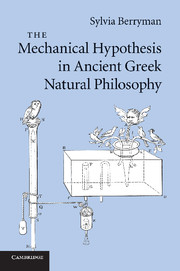Book contents
- Frontmatter
- Contents
- List of illustrations
- Acknowledgements
- Introduction
- 1 Mechanics and the mechanical: some problems of terminology
- 2 ‘Mechanistic’ thought before mechanics?
- 3 Mechanics in the fourth century
- 4 The theory and practice of ancient Greek mechanics
- 5 Ancient Greek mechanics continued: the case of pneumatics
- 6 The philosophical reception of mechanics in antiquity
- Conclusion
- Appendix: Ancient mechanics and the mechanical in the seventeenth century
- Bibliography
- Index of passages
- General index
2 - ‘Mechanistic’ thought before mechanics?
Published online by Cambridge University Press: 24 December 2009
- Frontmatter
- Contents
- List of illustrations
- Acknowledgements
- Introduction
- 1 Mechanics and the mechanical: some problems of terminology
- 2 ‘Mechanistic’ thought before mechanics?
- 3 Mechanics in the fourth century
- 4 The theory and practice of ancient Greek mechanics
- 5 Ancient Greek mechanics continued: the case of pneumatics
- 6 The philosophical reception of mechanics in antiquity
- Conclusion
- Appendix: Ancient mechanics and the mechanical in the seventeenth century
- Bibliography
- Index of passages
- General index
Summary
In this chapter I consider issues that form an essential background to the question how the development of ancient mechanics might have impacted on ancient natural philosophy. Such an impact could take different forms, and it is important to be clear on what would count as a ‘mechanical’ or ‘mechanistic’ conception, using the term to describe a way of conceiving of the natural world by reference to mechanics. The question needs to be posed in a way that is neither too broad nor too narrow in scope, in order to appreciate what effects the discipline of mechanics might have had on natural philosophy.
At a time when mechanics was understood to work because of principles that could be identified and theorized, we might expect philosophers to consider the applicability of these principles to the study of other kinds of motion and its causes. But it is also possible for natural philosophers to take inspiration from mechanics independently of such a theoretical understanding. Experience with constructing devices might give rise to new ideas about the properties of matter, or the way it interacts. The presence of working artifacts that can approximate the functions taken to be definitive of animals might call into question the distinction in kind between organism and artifact, or suggest ways that animal functions might be realized by material means.
- Type
- Chapter
- Information
- Publisher: Cambridge University PressPrint publication year: 2009



